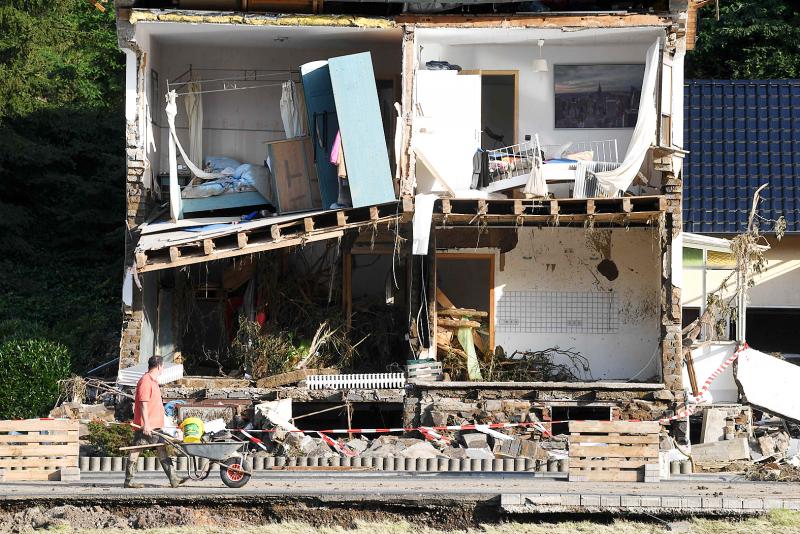Extreme weather events, such as heat waves and floods, have cost Europe almost 510 billion euros (US$576 billion) and about 142,000 lives over the past 40 years, a new report published yesterday said.
In its study, the European Environment Agency (EEA) called for continued adaptation measures at the individual and state levels.
A small number of extreme events, about 3 percent of the total, were alone responsible for about 60 percent of the financial damages incurred from 1980 to 2020, the report showed.

Photo: AFP
When it came to loss of human lives, heat waves accounted for 91 percent, with the heat wave experienced in the summer of 2003 killing about 80,000 people.
Similar heat waves after 2003 caused significantly lower fatalities, “as adaptation measures were taken in different countries and by different actors,” such as the installation of air-conditioners, the EEA said in a statement.
Globally, the UN’s World Meteorological Organization estimates that the number of weather-related disasters has increased over the past 50 years, causing more damage, but fewer deaths.
In Europe, the EEA said the data from the past 40 years do not allow for a definite conclusion to be drawn about whether the increase is due to climate change, because of the irregular damage recorded in different years.
“All the hazards we describe as weather and climate-related are influenced by climatic conditions. This said, that is not the same as saying they are all influenced by climate change,” EEA expert Wouter Vanneuville told reporters.
Recent studies, notably the work of the Intergovernmental Panel on Climate Change, indicate that the frequency and severity of events such as drought and forest fires are easier to link to climate change, he said.
For others, such as hailstorms, there is still a lack of evidence.
“For some types, like non-tropical storms, the climate signal in Europe is unclear, so it is uncertain if they will increase or not,” he said. “But for others — like droughts, not only in the Mediterranean, but over most of Europe — will intensify based on climate predictions.”
Germany was the country in Europe that suffered the most, with losses amounting to 107 million euros and 42,000 deaths over the past four decades.
This was followed by France (99 billion euros in damages and 26,700 deaths) and Italy (90 billion euros and 21,600 deaths).
Only 23 percent of material damages across Europe were covered by insurance, but there are also massive disparities between countries.
In Romania and Lithuania, only 1 percent was insured, compared with 55 percent in the Netherlands or 56 percent in Denmark.
Disasters such as earthquakes and volcanic eruptions are not included in these figures, as they are not meteorological.
According to a similar report by the US National Oceanic and Atmospheric Administration, the US has suffered 310 weather and climate disasters since 1980, with total damage exceeding US$2 trillion.

PARLIAMENT CHAOS: Police forcibly removed Brazilian Deputy Glauber Braga after he called the legislation part of a ‘coup offensive’ and occupied the speaker’s chair Brazil’s lower house of Congress early yesterday approved a bill that could slash former Brazilian president Jair Bolsonaro’s prison sentence for plotting a coup, after efforts by a lawmaker to disrupt the proceedings sparked chaos in parliament. Bolsonaro has been serving a 27-year term since last month after his conviction for a scheme to stop Brazilian President Luiz Inacio Lula da Silva from taking office after the 2022 election. Lawmakers had been discussing a bill that would significantly reduce sentences for several crimes, including attempting a coup d’etat — opening up the prospect that Bolsonaro, 70, could have his sentence cut to

China yesterday held a low-key memorial ceremony for the 1937 Nanjing Massacre, with Chinese President Xi Jinping (習近平) not attending, despite a diplomatic crisis between Beijing and Tokyo over Taiwan. Beijing has raged at Tokyo since Japanese Prime Minister Sanae Takaichi last month said that a hypothetical Chinese attack on Taiwan could trigger a military response from Japan. China and Japan have long sparred over their painful history. China consistently reminds its people of the 1937 Nanjing Massacre, in which it says Japanese troops killed 300,000 people in what was then its capital. A post-World War II Allied tribunal put the death toll

‘UNWAVERING ALLIANCE’: The US Department of State said that China’s actions during military drills with Russia were not conducive to regional peace and stability The US on Tuesday criticized China over alleged radar deployments against Japanese military aircraft during a training exercise last week, while Tokyo and Seoul yesterday scrambled jets after Chinese and Russian military aircraft conducted joint patrols near the two countries. The incidents came after Japanese Prime Minister Sanae Takaichi triggered a dispute with Beijing last month with her remarks on how Tokyo might react to a hypothetical Chinese attack on Taiwan. “China’s actions are not conducive to regional peace and stability,” a US Department of State spokesperson said late on Tuesday, referring to the radar incident. “The US-Japan alliance is stronger and more

FALLEN: The nine soldiers who were killed while carrying out combat and engineering tasks in Russia were given the title of Hero of the Democratic People’s Republic of Korea North Korean leader Kim Jong-un attended a welcoming ceremony for an army engineering unit that had returned home after carrying out duties in Russia, North Korean state media KCNA reported on Saturday. In a speech carried by KCNA, Kim praised officers and soldiers of the 528th Regiment of Engineers of the Korean People’s Army (KPA) for “heroic” conduct and “mass heroism” in fulfilling orders issued by the ruling Workers’ Party of Korea during a 120-day overseas deployment. Video footage released by North Korea showed uniformed soldiers disembarking from an aircraft, Kim hugging a soldier seated in a wheelchair, and soldiers and officials